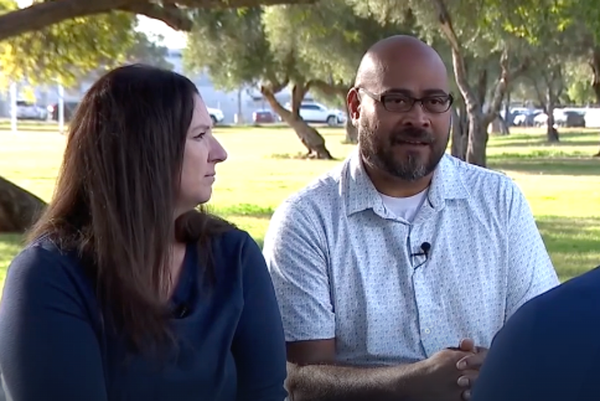Please enjoy the latest edition of Short Circuit, a weekly feature written by a bunch of people at the Institute for Justice.
New case! Last year, at the request of large dairy producers, Oregon agriculture officials decided to force small dairies to comply with the same regulations that apply to big dairies. Which means, for instance, installing ruinously expensive equipment to manage health concerns that simply don't exist when you have three cows in a pasture versus hundreds in confined spaces. Click here to learn more.
- Federal gov't alleges that illegal materials are destroying lives after being smuggled across the border between Mexico and the United States and demands that those who profit from their sale be held accountable. But in a Serlingesque twist it's the federal gov't of Mexico, the illegal materials are guns being smuggled south, and those who profit are U.S. gun manufacturers and distributors! First Circuit: And Mexico's claims are not barred by the Protection of Lawful Commerce in Arms Act. Mexico has adequately alleged that the defendants knowingly aided and abetted illegal downstream sales.
- In 2015, "Pharma Bro" Martin Shkreli obtained exclusive rights to antiparasitic Daraprim, jacked up the price from $17.50 to $750 per pill, and blocked the entry of a generic competitor. He's convicted of antitrust violations, ordered to disgorge $65 mil, and gets a lifetime ban on working in (or even speaking about) the pharma industry. Second Circuit (unpublished): Affirmed. And by clarifying the injunction to ban the bro's public statements about a particular company if intended to influence that company, the district court resolved any free-speech concerns.
- "The citizens of Chesapeake retain the right to fashion the destiny of their community," writes the Fourth Circuit, which is tough luck for the subset of people in Chesapeake, Va., who own property and want to build stuff on it.
- Fairfax, Va. mobile home park implements policy that requires evidence of lawful status in the U.S. of all adults living in the park. Households that don't comply have to pay more in rent but aren't actually evicted. Tenants: Fair Housing Act violation! Park: Hey, we have to do it under federal anti-harboring laws. Fourth Circuit: Actually, you don't.
- Anne Arundel County, Md., requires that gun sellers distribute pamphlets about firearms and suicide prevention and information on where to obtain a suicide-prevention toolkit. Gun rights group and gun retailers file a First Amendment lawsuit, alleging that the gov't is forcing them to convey messages designed to spook their customers out of buying guns. The gov't says it's all just factual and noncontroversial information, no different from any other product warning label. Who's right? Fourth Circuit: We're applying Zauderer, so obviously the gov't.
- Allegation: In police report, Dallas officer falsely claims that bar patron shoved him. The patron (who fell and broke his wrist after the officer punched him in the face) is charged with felony assault on an officer, though the charge is quickly downgraded and ultimately dismissed. Fabrication of evidence? Fifth Circuit (unpublished): Qualified immunity. It's clearly established that three officers can't confer and then give coordinated false statements to justify a shooting. But here only one officer allegedly lied, and he didn't really have time to deliberate over the lie, and the consequences of the lie were less grave.
- Motorist pulled over for unpaid toll violation declines Harris County, Tex. constable's order to exit his car and instead turns the engine back on. The officer jumps onto the door sill and fires into the vehicle without aiming as the car begins to move forward. The motorist dies. Fifth Circuit: Qualified immunity. At the moment he fired, the officer reasonably feared for his life. Concurrence: Our circuit's precedent, which requires us to ignore an officer's role in creating the danger that justified the use of deadly force, conflicts with Supreme Court precedent.
- Allegation: Houston police obtain arrest warrant (for armed robbery) by misleading a judge. When the suspect (who has a master's degree in criminal justice and is studying for the LSAT—and who was falsely accused by ne'er-do-wells with a grudge) is informed of the warrant, officers are told he will hire a lawyer and turn himself in later that day. Nevertheless, officers in plainclothes confront him outside his home and shoot him dead—without ever giving commands or announcing themselves. Fifth Circuit (unpublished): Denial of qualified immunity affirmed.
- After journalist asks Laredo, Tex. police officer to confirm facts that were part of a developing story, and the officer willingly did so, the journalist is … arrested! Her questions ran afoul of a Texas law that prohibits asking for information that hasn't been released to the public (a law that has been on the books for decades and never used before now, rather suspiciously against a critic of law enforcement). Can the state criminalize routine newsgathering of the kind that reporters do every day? Fifth Circuit (en banc, by a vote of 9-7): You betcha, First Amendment notwithstanding. [IJ filed an amicus brief urging a different course of action. For some in-depth journalism, here's the Texas Observer.]
- Parents challenge the FDA's issuance of an emergency-use authorization covering the COVID-19 vaccines for children, alleging that they fear someone will vaccinate their kids without parental consent, harass or marginalize them for their unvaccinated status, or push pro-vaccine messaging on them. But, per the Fifth Circuit (unpublished), none of those are cognizable injuries—the parents' citation to a Sesame Street video in which Elmo announces having gotten the COVID-19 vaccine notwithstanding.
- Working in concert with the ATF, Cincinnati police attempt to pull over a suspected arms- and drug-trafficker, who leads them on a high-speed chase. The suspect eventually loses control of his car, crashing into a restaurant and killing two people. Their estates sue the Cincinnati officers. Officers: We were working with the ATF, which basically makes us federal employees, which makes us immune from liability. Sixth Circuit: One of them, who was actually deputized by the ATF, is immune. The other two were just regular Cincinnati cops with no immunity. Concurrence/Dissent: I'd remand for more fact-finding on whether those two were acting under the direction of the deputized one.
- Troublesome inmate in the Wisconsin Dep't of Corrections inserts a two-inch screw into his arm, embedding it so far that it's no longer visible. Over screams and requests for anesthetic, prison doctor refuses to use anesthetic and roots around in the arm with forceps for several minutes (without success), all while saying things like "this is a consequence of your actions." Later taken to a hospital, the inmate has the screw removed (with anesthetic) in a painless three-minute procedure. Seventh Circuit: It sure seems like a jury might conclude the doctor acted with deliberate indifference to the inmate's medical needs. To trial the case must go.
- In 2021, FBI agents raided a safe deposit vault in Los Angeles, broke open every single box, and tried to civilly forfeit everything worth over $5k—all without individualized probable cause. The FBI tried to justify its search as an "inventory," and that argument worked at the district court. Not so much at the Ninth Circuit, which saw a slippery slope leading directly to the "very abuses of power … that led to the adoption of the Fourth Amendment in the first place." (This is an IJ case.)
- Man is convicted of sex crimes in Indian country against an Indian victim under statute that applies if either the perpetrator or victim is an Indian—but does not apply if both are. Man: The feds didn't show I am not an Indian. Feds: That's your fault for not objecting to the jury instructions. Tenth Circuit: That's your fault for not proving an essential element of the crime. Convictions reversed.
- Is it okay for a criminal-defense counsel to tell his (black) client that if he goes to trial, the jury "would be culled of any minorities" and he'd be tried before an all-white jury? Tenth Circuit: No, that's decidedly not okay. And given that misrepresentation about the right to a fair and impartial trial, the client's resulting guilty plea can't be said to have been knowing and voluntary. He gets to withdraw his guilty plea.
- In 2020, federal investigators found that Springfield, Mass. police officers were routinely using excessive force and then lying and withholding exculpatory evidence not only to cover it up, but also to obtain convictions against the very victims of their violence. Even so, the district attorney's office has continued to withhold from criminal defendants (past and future) that officers involved in their cases were implicated in these abuses. Massachusetts Supreme Judicial Court: Prosecutors have an "inescapable constitutional dut[y]" to investigate and disclose such info. Remanded for case-by-case adjudications. [IJ filed an amicus brief urging the court to reach this result and detailing the various immunity doctrines (the Heck bar and its state-law analogue first among them) that would have made it impossible for victims to obtain any remedy had it not.]
- And in en banc news, the Ninth Circuit will reconsider its decision that ZoomInfo—an online directory of professionals and their employment information—was not entitled to dismissal of a class action under California's anti-SLAPP law. But in a be-careful-what-you-wish-for twist, the grant comes after ZoomInfo filed a motion for panel rehearing, prompting the panel to sua sponte order the parties to brief whether the whole en banc court should consider whether ZoomInfo deserved to lose even harder. (Both sides opposed en banc rehearing.)
New case! After Theslet Benoir and Clemene Bastien received a permit to open the first food truck in the town of Parksley, Va., a member of the town council with ties to the restaurant industry harassed them, destroyed their property, and eventually convinced the rest of the council to ban food trucks. But the council assured Theslet and Clemene that they could continue operating until their permit expired … at least until IJ sent the council a letter asking them to reconsider the ban. The very next day, the town council sent Theslet and Clemene a letter ordering them to shut down immediately and threatening them with fines and jail for every day they had lawfully operated. Now, they've joined with IJ to sue the town and the council member to end this harassment and vindicate their constitutional rights. Click here to learn more.
The post Short Circuit: A Roundup of Recent Federal Court Decisions appeared first on Reason.com.







